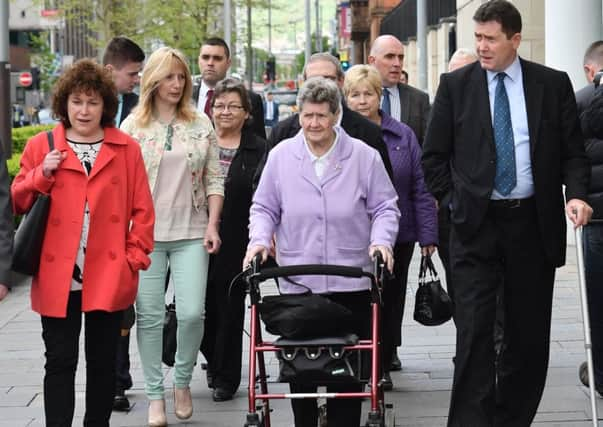Kingsmills relatives in plea for intelligence papers to be released


Coroner Judge Brian Sherrard, who is considering formal requests for some police and Army documentation to be blanked out, was told how the families’ trust in the legal system had been eroded.
Barrister Fiona Doherty QC, representing relatives of John McConville, said: “The immediate reaction is to suspect sinister motives for a request.
Advertisement
Hide AdAdvertisement
Hide Ad“That is not helped by the history of the case and by recent developments.”
During a hearing at Belfast Coroner’s Court it was revealed about 1,100 pages of classified material relate to the controversial case.
Barrister Richard Smyth, acting for the majority of bereaved relatives, said: “We would ask the court to consider how fundamentally important this process is to the families; how long they have waited.”
He said the court should also take into account the impact of recent developments including a major forensic breakthrough and the arrest of a murder suspect.
Advertisement
Hide AdAdvertisement
Hide Ad“Coming at the 11th hour, that has damaged trust,” added Mr Smyth. “The families have been left not knowing what to think.
“That trust is damaged and fragile.”
Ten Protestant workmen were gunned down when their minibus was ambushed in rural south Armagh on January 5 1976 in an attack seen as a reprisal for loyalist killings in the same area.
Those on board were asked their religion and the only Catholic was ordered to run away.
The killers, who had been hidden in the hedges, forced the rest of the textile factory workers to line up outside the van before opening fire.
Advertisement
Hide AdAdvertisement
Hide AdThose who died were John Bryans, Robert Chambers, Reginald Chapman, Walter Chapman, Robert Freeburn, Joseph Lemmon, John McConville, James McWhirter, Robert Samuel Walker and Kenneth Worton.
One man, Alan Black, survived, despite being shot 18 times.
No-one has ever been convicted.
The original inquest held in 1978 lasted just 30 minutes and recorded an open verdict, but after years of campaigning, Northern Ireland’s Attorney General John Larkin ordered the fresh probe in 2013.
Public evidence sessions in the high-profile inquest have been adjourned to facilitate two days of private hearings during which the reasons for so-called public interest immunity (PII) applications will be interrogated.
Ms Doherty QC said the coroner had an important task in balancing the public interest in disclosure against the public interest of non-disclosure.
Advertisement
Hide AdAdvertisement
Hide AdShe said: “The default position in legal proceedings should always be openness and transparency.”
Meanwhile, addressing his remarks to the campaigning families who had packed into courtroom number seven, Judge Sherrard said he would consider each PII request on its own merits.
“Each and every one of the proposed redactions will have to be justified,” he said. “It will be up to the applicant to persuade the court.”
Afterwards, victims campaigner Willie Frazer, who accompanied some relatives to court, said: “If there’s evidence there they should not be hiding it. If they do not disclose it all, then we will disclose it afterwards.”
The case has been adjourned.